39 what health claims are allowed on food labels
Recalls & Public Health Alerts | Food Safety and Inspection Service Impacted Products • 7.5-oz. sealed plastic container packages containing “ATLANTIS FRESH MARKET Italian Style Wrap” with lot codes 22195, 22196, 22199 and 22200, and “Enjoy before” dates of 07/30/22. 07/31/22, 08/01/22, 08/02/22 and 08/03/22 represented on the label. • 7.5-oz. sealed plastic container packages containing “RACHAEL’S FOOD CORPORATION Italian … General Food Labeling Requirements - California nutritional value of the food. Health Claim . describes the relationship between a food component and a disease or health-related condition. Food Allergens . All food labels must identify in plain language whether the food contains any of . eight (8) major food allergens: milk, egg, fish (e.g., bass, flounder, or cod), crustacean shellfish
In Pictures: 29 Foods With "Health Claims" That ... - Modern Health … Apr 26, 2013 · Foods With Health Claims: The Surprising Ways That Food Companies Try to Trick You. I casually walked through every aisle of the grocery store and picked out things with labels that could be considered misleading, or otherwise made you think the product is healthy. Things that children or uninformed people might fall for. The first one? Snapple.

What health claims are allowed on food labels
Dietary Supplement Health and Education Act of 1994 Under DSHEA, dietary supplements are deemed to be food, except for purposes of the drug definition. Dietary supplement labels. A "label" is a display of written, printed, or graphic material on the supplement container. DSHEA and other federal regulations require the following information to appear on dietary supplement labels: Label Claims for Food & Dietary Supplements | FDA Among the claims that can be used on food and dietary supplement labels are three categories of claims that are defined by statute and/or FDA regulations: health claims, nutrient content claims,... What health claim on a food label is not allowed? - Vigor Tip According to the FDA, health claims are statements about the relationship between a food product or ingredient and a reduced risk of disease or health condition. Basically, the FDA distinguishes between two types of health claims: "authorized" and "qualified". Permitted Health Claims: Claims that have significant scientific agreement (SSA).
What health claims are allowed on food labels. Questions and Answers on Health Claims in Food Labeling The Nutrition Labeling and Education Act of 1990 (NLEA) directed FDA to issue regulations providing for the use of health claims. All health claims must undergo review by the FDA through a petition... Factual Food Labels: Health Claims - 100% Online Health Claims. In 1990, the Nutrition Labeling and Education Act allowed claims that related a specific food component (e.g., oats) to lowered disease risk (e.g., reduced cholesterol) to be printed on the label of a food product. For example, if a company wants to place a health claim on their food packaging, such as "Heart Healthy," they ... “The best advice is to avoid foods with health claims on the label, ... People who suffer from certain diseases might also rely on food labels in order to determine whether they are allowed to eat certain foods or not. ... May increase overall health levels. Through food labels, it may also be possible to change the mind of many people ... Introduction to Food Product Claims — FDA Reader A health claim describes a relationship between a food and a reduced risk of a disease or a health-related condition. This can be made in words, images (i.e. a heart), or a reference to a 3rd party certification. Example of a Health Claim: "Diets low in sodium may reduce the risk of high blood pressure, a disease associated with many factors."
Health Claims - Canada.ca Health claims are also subject to Section 3 of the Food and Drugs Act that prohibits the labelling and advertising of any food to the general public, as a treatment, preventative or cure for any diseases and health conditions listed in Schedule A of the Food and Drugs Act. Legal Guide to Health Claims on Food | Law@Dayton Alcoholic beverage manufacturers are not allowed to make health claims on their packaging. "From the alcohol industry, you're prohibited from making any claim that it's going to give you any health," Professor Armstrong said. However, alcohol can be certified organic if it follows the same guidelines as organic food. Glossary of Food Label Terms CFR - Code of Federal Regulations Title 21 - Food and Drug Administration Mar 29, 2022 · Subpart A - General Provisions § 101.1 - Principal display panel of package form food. § 101.2 - Information panel of package form food. § 101.3 - Identity labeling of food in packaged form. § 101.4 - Food; designation of ingredients. § 101.5 - Food; name and place of business of manufacturer, packer, or distributor. § 101.7 - Declaration of net quantity of contents. Food Packaging Claims | American Heart Association It's important to understand what these claims mean so you can make informed decisions about the food you buy for yourself and your family. There are three categories of claims defined by statute and/or FDA regulations that can be used on food and dietary supplement labels: health claims, nutrient content claims, and structure/function claims.
Damning report unveils “misleading” nutrition labels in UK, calls … 28 Jul 2022 ---Campaigners are naming some of the world’s top multinational food companies in a report revealing items high in fat, salt or sugar (HFSS) are often mislabeled as nutritional products. The findings, published by Action on Salt (AoS) and ShareAction, are prompting a call for companies to reformulate popular brands and prioritize consumer health. Food labelling and packaging: Nutrition, health claims and supplement ... You cannot claim or imply that food can treat, prevent or cure any disease or medical condition. Food supplements, fortified foods and foods for specific nutritional uses You must follow certain... Easy Guide to Understanding Food Labels When You Have High ... - MyDoc Food labels tell you what is in the food and drinks you are consuming. Every packaged and processed product should have a food label to help you determine its nutrition content. The food labels can help you sieve through misleading claims, shop faster and make better food choices to lower your cholesterol levels. Health Claims on Labels: Can They Be Trusted? - Best Food Facts Health claims on food labels are regulated by the federal government. The claims must be verified by scientific data. The statements are optional, so food may have health benefits even if it doesn't carry a specific label. Label claims are a good starting point to learn about the nutrition of food. About The Experts Marie-Eve Labonte Nutrition
4 Common Food Label Violations + How to Avoid Them These claims include "healthy," "no added sugar," "good source of iron," "low sodium," and "plus fiber.". Although the safety of these food products is not a concern, the FDA has not authorized most nutrient content claims for foods that are intended for infants and toddlers. Unauthorized Health Claims: Everyone would love ...
False or misleading claims | ACCC Sometimes businesses may use wildly exaggerated or vague claims about a product or service that no one could possibly treat seriously or find misleading. For example, a restaurant claims they have the 'best steaks on earth'. These types of claims are known as ‘puffery’ and are not considered misleading. Examples of false or misleading claims
Nutrition, health and related claims - Food Standards You can only base health claims on food-health relationships that have been substantiated according to Standard 1.2.7. All health claims must be supported by scientific evidence to the same degree of certainty, whether they are pre-approved by us or self-substantiated by food businesses. General level health claims
Health Claims on Food Labels | LegalMatch In other words, a health claim can be a label on a product that says how the food is beneficial in helping to prevent or treat some kind of health condition. For example, your orange juice container may have a health claim on it about how the number of servings of orange juice each day can help reduce the risk of heart disease.
Label Claims for Conventional Foods and Dietary Supplements Mar 07, 2022 · Among the claims that can be used on food and dietary supplement labels are three categories of claims that are defined by statute and/or FDA regulations: health claims, nutrient content claims ...
5 Understanding Food Labels and Health Claims - Maricopa Health Claims & Foods To keep companies from making false claims, the FDA provides food manufacturers' regulations in putting labels on packages that promote health. There are three levels of health claims: A health claim is supported by scientific evidence. An example is "reduces heart disease."
Factual Food Labels: Health Claims - University of Texas at Austin Generally, these labels are found on the front side of the food package in emphasized lettering. Health Claims In 1990, the Nutrition Labeling and Education Act allowed claims that related a specific food component (e.g., oats) to lowered disease risk (e.g., reduced cholesterol) to be printed on the label of a food product.
Which Health Claims Are Allowed On Food Labels - WhatisAny What health claim on a food label is not allowed? Health claims for treating, preventing, or curing diseases, such as Alzheimer's and cancer are not allowed on food products. These are considered to be drug claims.
Health Claims on Food Labels - LabelCalc Health claims, according to the FDA, are statements about the relationship between a food product or ingredient and a reduced risk of disease or a health condition. Basically, the FDA distinguishes two kinds of health claims: "authorized" and "qualified." Authorized Health Claims: Claims that have significant scientific agreement (SSA ...
What health claim on a food label is not allowed? - Vigor Tip According to the FDA, health claims are statements about the relationship between a food product or ingredient and a reduced risk of disease or health condition. Basically, the FDA distinguishes between two types of health claims: "authorized" and "qualified". Permitted Health Claims: Claims that have significant scientific agreement (SSA).
Label Claims for Food & Dietary Supplements | FDA Among the claims that can be used on food and dietary supplement labels are three categories of claims that are defined by statute and/or FDA regulations: health claims, nutrient content claims,...
Dietary Supplement Health and Education Act of 1994 Under DSHEA, dietary supplements are deemed to be food, except for purposes of the drug definition. Dietary supplement labels. A "label" is a display of written, printed, or graphic material on the supplement container. DSHEA and other federal regulations require the following information to appear on dietary supplement labels:

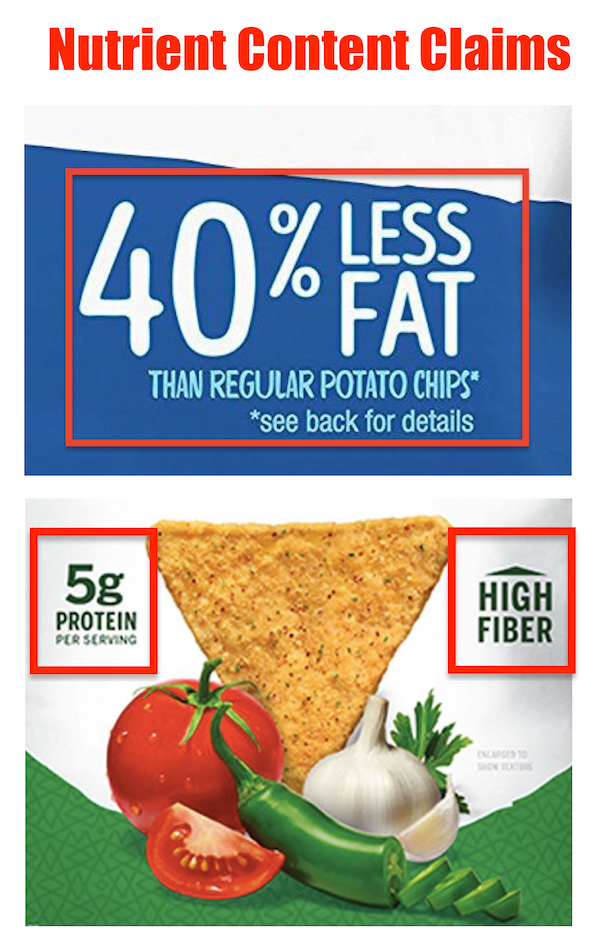
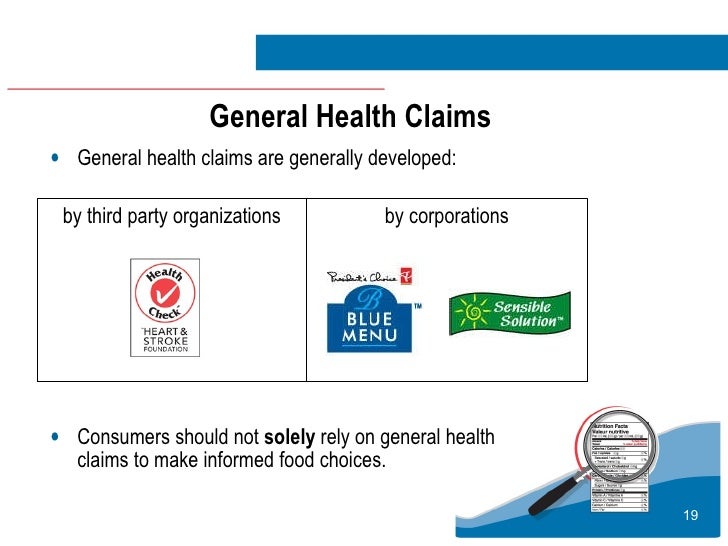





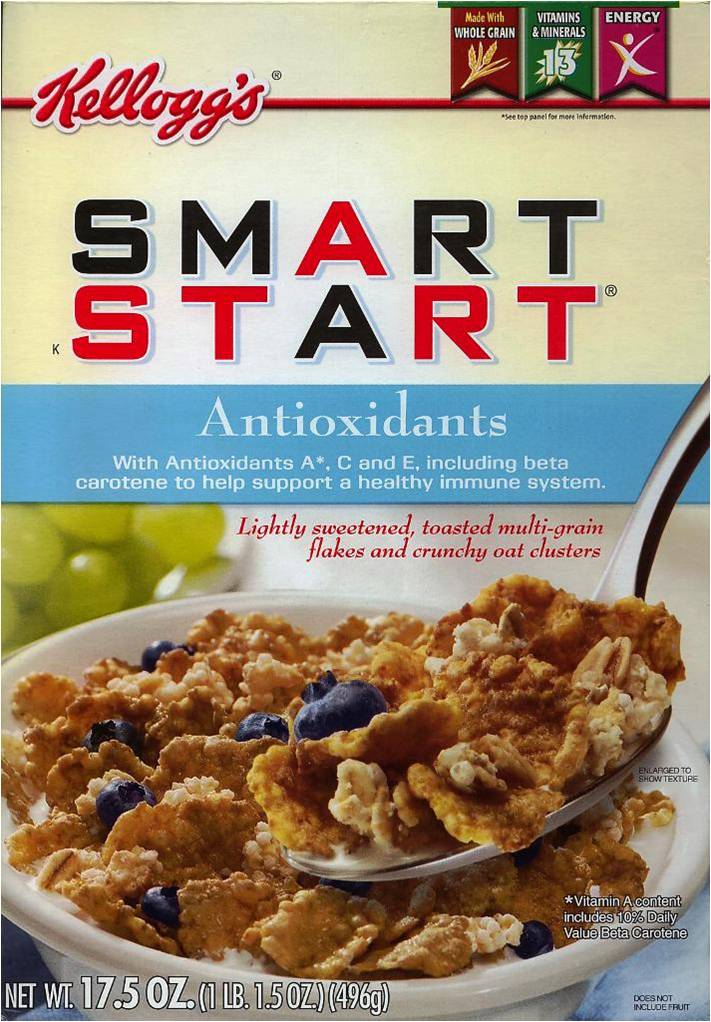

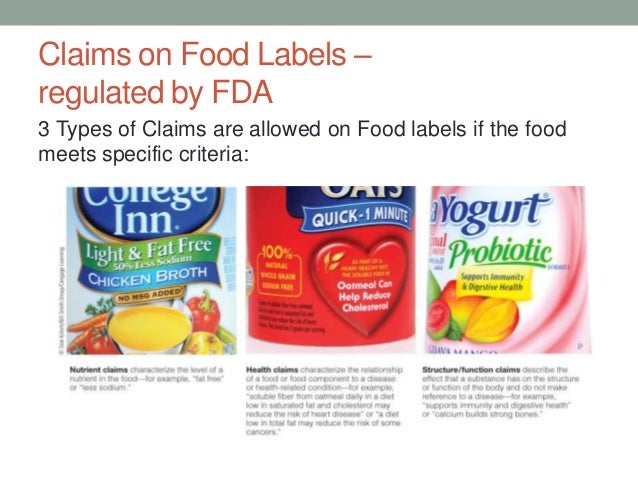


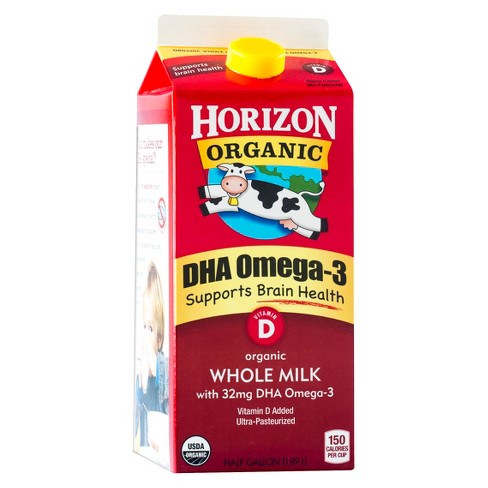
Post a Comment for "39 what health claims are allowed on food labels"